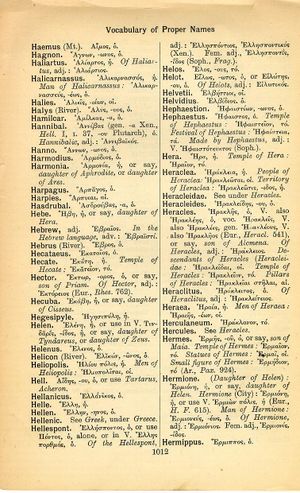Herculaneum: Difference between revisions
(Names) |
(6_7) |
||
| Line 1: | Line 1: | ||
{{WoodhouseENELnames | {{WoodhouseENELnames | ||
|Text=[[File:woodhouse_1012.jpg|thumb|link={{filepath:woodhouse_1012.jpg}}]]Ἡράκλανον, τό. | |Text=[[File:woodhouse_1012.jpg|thumb|link={{filepath:woodhouse_1012.jpg}}]]Ἡράκλανον, τό. | ||
}} | |||
{{Lewis | |||
|lshtext=<b>Hercŭlānĕum</b>: (Hercŭlānĭum, Plin. 3, 5, 9, § 62; [[but]] the [[modern]] form Herculanum is not Lat.; in Cic. Att. 7, 3, 1, [[read]] [[Aeculanum]]; v. Orell. ad loc.), ĕi, n., = Ἡράκλειον,<br /><b>I</b> a [[town]] of [[Campania]], [[situated]] on the [[sea]]-[[coast]], [[between]] [[Naples]] and [[Pompeii]], and buried [[along]] [[with]] the [[latter]] [[city]] by an [[eruption]] of [[Vesuvius]], A. D. 79, Mel. 2, 4, 9; Plin. 3, 5, 9, § 62; Sisenn. ap. Non. 207, 9; Liv. 10, 45; Vell. 2, 16, 2; Sen. Q. N. 6, 26 fin.; Flor. 1, 16.—<br /><b>II</b> Derivv.<br /> <b>A</b> Her-cŭlānĕus (-lanus), a, um, adj., of or belonging to [[Herculaneum]], Herculanean: via, Cic. Agr. 2, 14, 36; Plin. 15, 18, 18, § 72; Cloat. ap. Macr. S. 2, 16.—Form [[Herculanus]]: [[ficus]], [[Cato]], R. R. 8, 1: via, Flor. 4, 8, 6.—<br /> <b>B</b> Hercŭlānensis, e, adj., the [[same]]: [[fundus]], Cic. Fam. 9, 25, 3; for [[which]] absol.: [[villa]] in Herculanensi, in the [[vicinity]] of [[Herculaneum]], Sen. de Ira, 3, 22. —Subst.: Hercŭlānenses, ĭum, m. <[[number]] opt="n">plur.</[[number]]>, the inhabitants of [[Herculaneum]], Herculaneans, Inscr. Grut. 439, 6. | |||
}} | }} | ||
Revision as of 08:32, 13 August 2017
English > Greek (Woodhouse)
Ἡράκλανον, τό.
Latin > English (Lewis & Short)
Hercŭlānĕum: (Hercŭlānĭum, Plin. 3, 5, 9, § 62; but the modern form Herculanum is not Lat.; in Cic. Att. 7, 3, 1, read Aeculanum; v. Orell. ad loc.), ĕi, n., = Ἡράκλειον,
I a town of Campania, situated on the sea-coast, between Naples and Pompeii, and buried along with the latter city by an eruption of Vesuvius, A. D. 79, Mel. 2, 4, 9; Plin. 3, 5, 9, § 62; Sisenn. ap. Non. 207, 9; Liv. 10, 45; Vell. 2, 16, 2; Sen. Q. N. 6, 26 fin.; Flor. 1, 16.—
II Derivv.
A Her-cŭlānĕus (-lanus), a, um, adj., of or belonging to Herculaneum, Herculanean: via, Cic. Agr. 2, 14, 36; Plin. 15, 18, 18, § 72; Cloat. ap. Macr. S. 2, 16.—Form Herculanus: ficus, Cato, R. R. 8, 1: via, Flor. 4, 8, 6.—
B Hercŭlānensis, e, adj., the same: fundus, Cic. Fam. 9, 25, 3; for which absol.: villa in Herculanensi, in the vicinity of Herculaneum, Sen. de Ira, 3, 22. —Subst.: Hercŭlānenses, ĭum, m. <number opt="n">plur.</number>, the inhabitants of Herculaneum, Herculaneans, Inscr. Grut. 439, 6.

